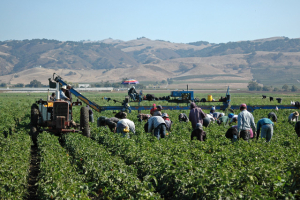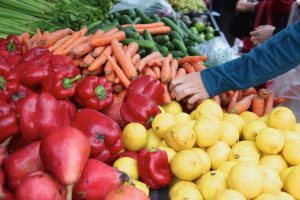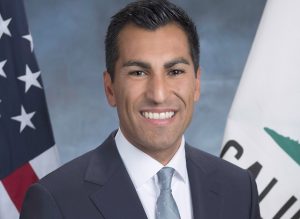Coming Together in the San Joaquin Valley
May 13, 2015 Roots of Changeby Holly Calhoun, Roots of Change.
April 30, 2015 – “We are all in this together” Chukou Thao said acknowledging the various groups in the room at the Nation Hmong American Farmers Association Annual Meeting: the Filipino Farmers, African American Farmers, Latino Farmers, Lideras Campesinos, farmers from Laos, the Rural Coalition, and agency partners from the United States Department of Agriculture. Chukou Thao opened the meeting by acknowledging the progress that the movement of socially disadvantaged farmers and ranchers has made by coming together.
Coming together was indeed a theme echoed throughout my trip through the Central Valley to attend the conference. I visited the Tulare County Department of Public Health who is planning a series of health fairs and healthy retail initiatives in Farmersville. The food access needs in Farmersville are very real. This is the great tragic irony of California’s Central Valley, which produces the majority of the fresh produce consumed in the United States but suffers disproportionately from high levels of food insecurity and accompanying preventable, diet related diseases. The newly elected Mayor of Farmersville related a story from the campaign trail, about a woman chasing him down the block to speak with him about the need for a grocery store in the community. In Tulare, the Department of Public Health is hard at work with solutions for the lack of fresh food access, through health fairs and healthy retail, and by building partnerships with local farmers, community and senior centers, and nearby farmers markets.
The Health Department and partners planning these immediate interventions in Tulare are also in the initial phases of starting a food policy council, which would bring a broader group of stakeholders to the table to address upstream food issues and health in the county. Taking a preventative approach to health issues requires people from across sectors to come together to create solutions. In Tulare, they are finding that people are coming together to address these issue within their county, and across counties. The Kern Food Policy Council has made progress on food issues, including a healthy retail initiative, and takes a leadership role in the statewide California Food Policy Council. Kern is providing a model to Tulare. By coming together and learning from each other, food policy councils and public health departments in counties across the Central Valley region can make progress better and faster. The California Food Policy Council is working to bring stakeholders together to accelerate that progress.
At the National Hmong American Farmers Association Meeting, small farmers spoke about their concerns with the drought and the lack of water that they have to grow the food that nourishes their communities. One farmer lost her farm when the well collapsed and is now having to start all over again after already having built a successful business with 60 employees.
Lideras Campesinas used theater to teach the audience about the health issues that farmworkers face every day: exposure to heat and pesticides, lack of water, shade and rest, and sexual abuse. The performance was chilling. It is unacceptable that workers are exposed to this kind of abuse.
At the meeting in Fresno, people came together to work toward solutions for these wrongs and inequities. From across organizations, agencies, and county lines came to share resources and knowledge with each other, and to make progress toward a better, more resilient, and healthy food system.
“We are all in this together.”



